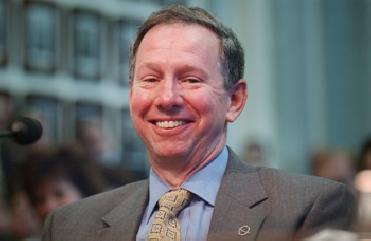
A file photo of Present NASA administrator Michael Griffin.
WASHINGTON (BNS): Too many questions are doing the rounds among space enthusiasts in the US as President-elect Barack Obama announces his new team, and enthusiastically continue to call for change.
Who will head NASA after Michael Griffin? Will the US build a brand new moon rocket, if so, when? How will NASA tackle the issue of retiring rockets to keep up its commitment to the International Space Station? Will it be forced to depend on Russia for a long time to service the ISS?
NASA administrator Michael Griffin and the leader of President-elect Barack Obama's transition team, Lori Garver, are having negotiations and compiling reports on cost overruns and delays in major NASA missions.
An article in the Washington Post talks about the uncertainties dogging NASA, where everything is planned many years in advance, broad strategies take decades to implement and the engineering is customised down to the last bolt.
Griffin, a brilliant rocket engineer, said that he does not expect to be retained.
Also unknown is the fate of the Constellation programme, which includes return of astronauts to the moon and possibly a manned mission someday to Mars.
The newspaper said that the NASA plan, based on President Bush's 2004 'Vision for Space Exploration' and authorised by Congress, had been vigorously promoted by Griffin. The key elements include the completion of the International Space Station, the retirement of the shuttle, and the construction of a spaceflight system featuring two new rockets and a new crew vehicle that would be capable of journeys to the space station, the moon and beyond.
The current NASA administrator has made it clear that he has no interest in staying if it means a significant shift in strategy. "But the transition team has asked about cost savings that might come from scrapping the booster, called the Ares I that is under development as part of Constellation. The less costly alternative would be to upgrade existing rockets, such as the Delta IV or Atlas V, that currently are not rated as safe for human spaceflight," the newspaper said.
The paper sought Griffin's opinion on whether scrapping the Ares for a different rocket would be the kind of strategic change that would ensure his exit. He replied, "I don't know where the threshold is, but dictating design solutions to NASA on any technical subject, launch vehicles or otherwise, is above it”.
“NASA's purpose is to produce technical solutions to achieve space policy goals enunciated from above. If agency management cannot be trusted to do that, they should be replaced. Specifying solutions from outside the agency cannot possibly work."
During a book-signing event at the NASA headquarters library, Griffin and Lori Garver, primarily discussed the rocket strategy.
The Post quoted NASA spokesman Chris Shank as saying that the two discussed the merits of Ares I, which is based on the solid rocket boosters used for the shuttle. "How tense it got is a matter of dispute. It was a normal, everyday chat, not an argument. Voices were never raised," Shank said.
Another paper, Orlando Sentinel, said that the NASA administrator was “uncooperative” with the transition team and that Griffin became “red-faced”.
The Post quoted that to clear the air; Griffin wrote an e-mail to NASA employees and said that the agency was totally cooperative.
However, Shank confirmed that no one on her transition team had the engineering qualifications to assess the rocket strategy.
NASA administrator's aggressiveness may not have been the most political savvy way to keep his job, but no one could say it was out of character.
"With multiple degrees, including a doctorate in aerospace engineering, Griffin is not reluctant to reveal the confidence he has in his judgments. And he may be lobbying for the ambitious Constellation programme as much as for himself. He has always been a true believer in what he calls 'the majesty of spaceflight,' and he fervently hopes to see human civilisation expand across the solar system," the Post said.
"He has worked very hard on the current approach to going back to the moon and believes that it is the best of all possible approaches," John Logsdon, former director of the Space Policy Institute at George Washington University, said of Griffin.
"Any threat to that is a threat to him and his technical judgment. And so a transition team that is even doing just due diligence, asking the questions that they should ask, he seems to have interpreted it as a challenge," Logsdon was quoted as saying.
NASA associate administrator Ed Weiler (a potential successor to Griffin), was quoted as saying that he would like to see his boss stick around for a while, particularly with the tricky space shuttle mission to repair the Hubble Space Telescope coming up next spring. "I'd certainly like to have a leader who was an experienced engineer or whatever”.
It is still not known what Obama thinks about the civilian space programme.
"His attitude towards NASA evolved during the campaign. In November 2007, he raised the possibility of delaying Constellation for five years as a way of scrounging up billions of dollars for an education initiative. But with Florida playing a key role in the election, Obama came out in favour of an extra $2 billion in funding for NASA. In August, he issued a paper explicitly endorsing a lunar mission by 2010," the Post said.
Whoever runs NASA will have to cope with a major problem in the US human spaceflight capacity in the near future.
"Under current policy, there will be a gap of four years or so between the retirement of the shuttle in 2010 and the launch of the Ares booster and the accompanying Orion capsule that will carry the astronauts. The only way to send astronauts to the international space station would be on a Russian Soyuz rocket. And US-Russian relations are strained at best."
According to the newspaper, an extension of the shuttle's lifetime beyond 2010 is an expensive option. "NASA's $17 billion budget has been relatively flat for years. The only way to build new moon rockets on a flat budget, Griffin and others have calculated, would be to retire the shuttle and channel that money to the new programme. The shuttle programme is being dismantled, and any decision to extend it needs to be made sooner rather than later”.
The Washington Post quoted Scott Pace, the new director of the Space Policy Institute, as saying that those who talk don't know, and those who know don't talk.
 Previous Article
Previous Article Next Article
Next Article













The Indian Air Force, in its flight trials evaluation report submitted before the Defence Ministry l..
view articleAn insight into the Medium Multi-Role Combat Aircraft competition...
view articleSky enthusiasts can now spot the International Space Station (ISS) commanded by Indian-American astr..
view article